The world's largest handmade Quran was unveiled in Kabul, Afghanistan in 2012. It was crafted by Afghan calligrapher Mohammed Sabeer Khedri Hussani and his team.
The world's largest handmade Quran was unveiled in Kabul, Afghanistan in 2012. It was crafted by Afghan calligrapher Mohammed Sabeer Khedri Hussani and his team.
The largest Quran was produced over a five-year period by Afghan calligrapher Mohammed Sabeer Khedri Hussani and his team of nine student apprentices. The Quran stands over seven feet tall and five feet wide, with a total weight of 1,102 pounds. It comprises 218 pages, all of which are bound in an embossed leather cover made from the hides of 21 goats. The project emoloys the art of Quranic calligraphy and Islamic decoration. [1]
The project, sponsored by the Afghan Ismaili leader Sayed Mansur Naderi, aimed to manifest Afghanistan's cultural heritage and Islamic scholarship. Initiated in September 2004 and completed in September 2009, the unveiling took place in January 2012, amid ceremonies attended by government officials, religious leaders, and the public. [2] According to Arabian Business, Farkhunda Zahra Naderi, the sponsor's daughter, also had a leading role in the project, particularly in the renovation of the library that houses the Quran. [3]
The placement of the Quran in the Hakim Nasir Khusraw Balkhi Cultural Center is part of a wider initiative to safeguard and promote Afghan culture. [1]

Afghanistan, officially the Islamic Emirate of Afghanistan, is a landlocked country located at the crossroads of Central Asia and South Asia. Referred to as the Heart of Asia, it is bordered by Pakistan to the east and south, Iran to the west, Turkmenistan to the northwest, Uzbekistan to the north, Tajikistan to the northeast, and China to the northeast and east. Occupying 652,864 square kilometers (252,072 sq mi) of land, the country is predominantly mountainous with plains in the north and the southwest, which are separated by the Hindu Kush mountain range. Kabul is the country's largest city and serves as its capital. According to the World Population review, as of 2021, Afghanistan's population is 40.2 million. The National Statistics Information Authority of Afghanistan estimated the population to be 32.9 million as of 2020.

Ahmad Shah Massoud was an Afghan politician and military commander. He was a powerful guerrilla commander during the resistance against the Soviet occupation between 1979 and 1989. In the 1990s, he led the government's military wing against rival militias; after the Taliban takeover, he was the leading opposition commander against their regime until his assassination in 2001.
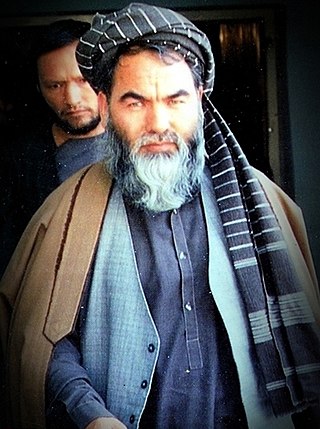
Abdul Ali Mazari was an Afghan Hazara politician and leader of the Hezbe Wahdat during and following the Soviet–Afghan War, who advocated for a federal system of governance in Afghanistan. He believed that this would end political and ethnic division in Afghanistan by guaranteeing rights to every ethnic group. He was allegedly captured and murdered by the Taliban during negotiations in 1995. In 2016, he was posthumously given the title "Martyr for National Unity of Afghanistan" and had a statue erected in his honor by the Islamic Republic of Afghanistan. Shortly after reclaiming power, the Taliban demolished the statue.
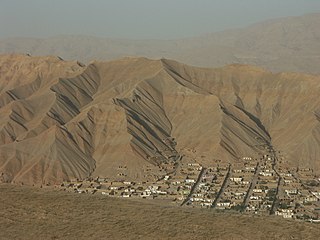
Baghlan is one of the thirty-four provinces of Afghanistan. It is in the north of the country. As of 2020, the province has a population of about 1,014,634.

Abdul Rasul Sayyaf is an exiled Afghan politician and former mujahideen commander. He took part in the war against the Marxist–Leninist People's Democratic Party of Afghanistan (PDPA) government in the 1980s, leading the Afghan mujahideen faction Ittehad-al-Islami.

Islam in Afghanistan began to be practiced after the Arab Islamic conquest of Afghanistan from the 7th to the 10th centuries, with the last holdouts to conversion submitting in the late 19th century. It was generally accepted by local communities as a replacement of Zoroastrianism and Buddhism, local tribes began converting to the new religion. Islam is the official state religion of Afghanistan, with approximately 99.7% of the Afghan population being Muslim. Roughly 90% practice Sunni Islam, while around 10% are Shias. Most Shias belong to the Twelver branch and only a smaller number follow Ismailism.

Quran desecration is the treatment of the Quran in a way that might be considered insulting.
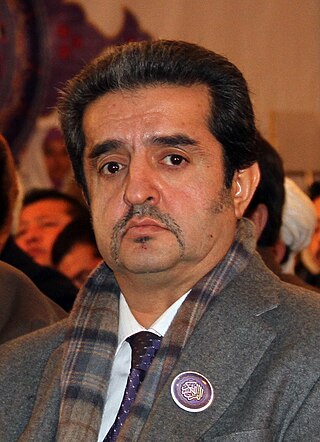
Sayed Jafar Naderi is an ethnic Tajik-Ismaili who controlled Baghlan Province of Afghanistan during the early 1990s. He was born in Kayan, Baghlan and is also known as Sayyid-e Kayan. The son of Sayed Mansoor Naderi, The previous Vice-President of Afghanistan, Sayed Jafar Naderi went to school in England at age 10, after his father was made a political prisoner. He was sent to the United States at age 13 where he became known as Jeff Naderi.
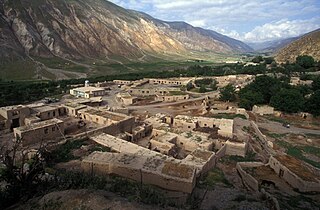
Kayan is a village in Baghlan Province in north eastern Afghanistan It is located in the valley of Kayan, some 30 kilometres west of Dushi. The residents of Kayan valley are mostly members of Sadat and Hazara tribes loyal to Sayed Kayan who was the official representative of Aga Khan in Afghanistan. The Sayyids follow Isma'ili Islam.

This is a timeline of the background of the history of the Taliban. It details the Taliban movement's origin in Pashtun nationalism, and briefly relates its ideological underpinnings with that of broader Afghan society. It also describes Taliban's consolidation of power, listing persecutions by Taliban officials during both its five years in power in Afghanistan and its war with the Northern Alliance. It further covers Taliban's time in power, its fall following the US invasion and its fight against the subsequent occupation, as well as its eventual return to power.

Sayed Kayan or Sayed of Kayan is a ruling title in northern areas of Afghanistan. Ismaili community in Afghanistan is led by this family of Syeds hailing from the village of Kayan Baghlan.

Sayed Mansur Naderi is incumbent Sayed of Kayan; leader of Ismaili Shi'a community of Afghanistan centred in Baghlan Province. This community although Shia is smaller than the mainstream Twelver Shia community in Afghanistan.

Shia Islam in Afghanistan is practiced by a significant minority of the population. According to a PEW 2021 survey, 7% of Afghans followed Shia Islam, but other estimates have put the number as high as 35%. Afghanistan's Shia are primarily the Twelvers, while a minority are Ismailis.

Afghanistan–United Arab Emirates relations refers to the bilateral relations between Afghanistan and the United Arab Emirates (UAE). In December 2022, Afghan Defense Minister Mullah Yaqoob along with Anas Haqqani made an official visit to the UAE. There he met with UAE President Mohamed bin Zayed Al Nahyan and Vice President Mohammed bin Rashid Al Maktoum.
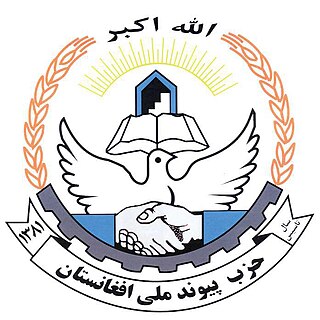
The National Solidarity Party of Afghanistan or some other places written as National Unity Party of Afghanistan is a political party representing the Afghanistan's Ismaili Shia minority, largely found in Kabul Province, Baghlan Province, Bamyan Province, Balkh Province and Badakhshan province. As recently as 2020 it was one of 84 political parties registered with the Afghan Ministry of Justice, and headed by Sayed Mansur Naderi.
The 6th Corps was a corps of the Afghan Army, seemingly active from 1990 to around 2003–2004. Created as a military formation of the PDPA's standing army, it degraded into a grouping of militias by its last years.

Sayed Sadat Mansoor Naderi is an entrepreneur and politician. He was Afghanistan's State Minister for Peace from 2020 to 2021 and Minister of Urban Development and Housing from 2015 - 2018.
Mirwais Azizi is a Dubai-based Afghan businessman. He is the chairman of Azizi Group of companies, which he founded in 1989 with a presence in realty, banking, investment, and hospitality. He is also the chairman of Azizi Bank, which he established in 2006 in Kabul, Afghanistan, with $7.5 million in equity capital and has since reached up to $80 million.